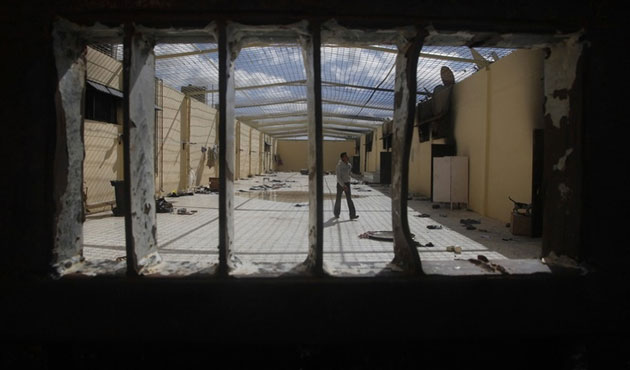Being in prison is a life-changing experience. Even if a prisoner is convicted for a crime that they have committed, being confined for such an extensive period of time is in itself an ordeal.
While prison is said to provide some people with a second chance to start over, others are too old, too sick or just too scared to start again. Even if they were willing and able, what could they really do with this second chance? How do we ensure that these prisoners have actually changed and that they have a fair opportunity in life? And what is the role of the government and society in all of this?
“First of all, it’s important to know that legally, the government is not obliged to provide prisoners with anything after they serve their time. We are not responsible for helping them find a job, a place to live or anything. We only ask them to come to the station once or twice a week to see how they are doing,” says a high-ranking officer in the Egyptian prison system who asked not to be named.
“It is too expensive to provide everyone with a home or a job. I don’t think our government can afford that. Plus, if we do that, it would be like we are supporting the criminals – as if we are saying: bravo, you committed a crime and you were homeless, now you are free and you have a job and a home,” he adds sarcastically.
Inmates usually learn crafts like carpentry, plumbing and gardening to help them get jobs after they leave. They earn money for the work that they do, which is converted into coupons for the cafeteria, and from there, they can order meals – besides what prisoners are normally served. The skills they learn often depends on the crime that the inmate committed, explains the officer. “For example, if he is in for murder, we won’t teach him carpentry, as he can turn any tool into a killing weapon,” he says.
Inmates are also allowed to continue their education and take exams from inside prison. According to Egyptian law, prisoners are also entitled to free medical care during their time in prison, although human rights’ activists contest whether this happens; others question the quality of the care available.
Each prison facility has a social worker that is responsible for checking on the overall well-being of the inmates and helping pregnant women and young mothers; however, no psychiatrists are available in Egypt’s prisons. “We have at least one social worker for every 1,000 prisoners. So even if that social worker was a psychiatrists (which is sometimes the case), do you think he/she will remember anything about any of the 1,000 inmates they are responsible for? To get the formula right, we need thousands of psychiatrists, which is impossible,” says the officer.
So who decides if an inmate has in fact changed? Who assesses that these prisoners have reformed?
“Well, no one does and most inmates don’t change. They leave and most of them go back to their old habits; some of them get caught and come back to prison, and others hide out and die fugitives. In very rare cases, a psychiatrist is appointed to inmates, but even if he/she thinks the inmate is not fit to leave for any reason, he will still go free after the sentence has been served,” says the officer.
But when it comes to rehabilitation and integration into society, the matter is much more complicated, as many ex-convicts are stigmatized and struggle to find work.
“You should ask Egyptian society why no one agrees to hire inmates after they serve their time – no matter what their crime was. Many of them think: why hire an ex-convict when I can hire someone without a record? There are a few organizations that get factories to employ ex-inmates as part of their social responsibility programs, but it is not enough. Society as a whole needs to lend a helping hand; otherwise, it is not really a second chance. In most cases, by the time the inmate finishes his sentence, even his family doesn’t want to be associated with him because of the stigma,” the officer says.
“How can you expect a man/woman just out of prison to go back to social life without any transition? With no psychiatrist on board, we can never be sure of the well-being of an inmate, let alone know if it’s okay for them to be around people again,” says psychiatrist and human rights activist Shadia. Shadia, who asked that her name be changed, has a private psychiatric practice and works in a public hospital.
“There must be a psychiatrist on board from day one, at least for serious rape and murder cases, or else there is no point of letting them out. Also, not offering them any support after they have served their sentence is very strange, as in many countries they offer a group home or some sort of a living arrangement if they don’t have one. With no job, no place to live, no family and a very judgmental community, what are they supposed to do? Who will they be? It is no surprise that many of them end up back in jail or dead within a year or two of being released,” Shadia says.
An Honorable Killer
Salem was sentenced to 15 years in jail for killing a man, and has been out of prison for two years. “Back then, I owned a kiosk on the same street as my house in Shobra. One day, I heard screaming coming from my building, so I grabbed a wooden stick and ran to see what was going on. I ran up the stairs until I came to the flat that the screaming was coming from. To my surprise, the sound was coming from my home. I struggled a bit with the keys to open the door, as my hands were shaking badly. I ran inside to find my daughter screaming while a man who had her fixed to the wall was trying to rape/assault her. I screamed and grabbed him hard but he was so fixated – it was like he was on drugs. I pushed him away but he kept coming back for her, so I had no choice but to hit him hard on the head with the stick in my hand. One strike and he was on the ground. I looked back at my hysterical daughter and hugged her tightly until the police came. I still remember the sound of her screams and the sight of the man lying on the ground without his pants and with blood coming out of his head,” says Salem.
According to his account, there was not enough evidence to prove that the man was trying to assault his daughter, and the lawyer somehow proved that it was premeditated. “This man was my brother’s neighbor from across the street, and he had asked to marry my daughter but she said no, and I respected her wishes… but his lawyer said that my daughter was trying to seduce him so she could marry him because he was financially stable and we were poor,” says Salem.
Salem explains that at the time of the accident, most of the neighbors were out, making it difficult for him to find witnesses to support his case. “Everyone was at work, and only a few kids and women were in the building. The women were either too scared to testify, or bribed by the lawyer or didn’t really see much,” Salem says.
When Salem first went to prison, his wife, two teenage daughters and five-year-old son used to visit him once a month. Three years later, they disappeared. He later learned that they moved away to escape the embarrassment of his imprisonment and the horrible rumors about Shaza – his assaulted daughter.
“By the time I got out, my wife was dead and my daughters and son were married in Helwan. I went to see them, but they wanted nothing to do with me, as they hadn’t shared what happened with their spouses. It was just like what we see in the movies – they told their spouses, neighbors and everyone that I was dead. What hurts the most is that I killed this man to protect my own daughter and I would do it again. How can she deny me the right to be alive, when all I did was protect her? I just don’t understand,” he adds.
He explains that he still gets nightmares about what would have happened to his daughter if he hadn’t heard her screams and intervened at the right moment.
He explains that his son agreed to help him out, but only from afar. “He offered to help me financially, but I refused. I went back to my favorite prison guard, who had become my friend over the years, and asked him to help me find a job. He got me a job as a gardener here and there, as I learned some gardening skills in prison. I make my living and I keep my head down until God takes me. After all, I am 65 years old and no one needs me. Some days I wish I could go back to prison. At least I had my routine, I had friends, I had no expenses, and I was just living. No matter how hard life is in prison, this life is much harder,” says Salem.
The Pregnant Drug Dealer
When Bassma was 22, she went to prison for selling drugs. She was pregnant and her daughter Malak was born in prison. “They let me keep her for two years, and I have to say, despite everything, those first years of motherhood were the best in my life. I watched her grow and that was more than I could ever dream of. Then after two years, Hussein [my husband] took away Malak and I never saw her again,” Bassma says.
According to Egyptian law, convicts with toddlers are allowed to keep children until the age of two. Afterwards, children are taken to live with families outside of prison or are handed over to government orphanages if they have no family that is willing to take them.
Bassma explains that her husband was a drug dealer who forced her to sell drugs. When she tried to distance herself from his work, he threatened to kill her family. “I was in this marriage because we were very poor and my family needed the money. My father told me that Hussein was a good man and that he was rich, and that at least I would live in a house and eat good food. But Hussein was just looking for a fourth wife to help him sell drugs,” Bassma says.
After five years in prison, Bassma was released last year. Now, all she cares about is finding her daughter. “I don’t know where to look, and every lead I take is a dead end. I need money to be able to travel around, so I work for six months and then I look for my daughter for a month or two until my money runs out. I take any work that I can find, and if there is nothing to do, I beg on the streets. I will do anything to find my daughter,” she says.
“Prison conditions aren’t that bad. If you are a good person and you keep to yourself, you will survive. Making friends is also a must, because friends protect you. After all, the guards aren’t always around and being locked up brings out the worst in people. For me, making friends was easy, because I was pregnant and everyone pitied me. And the other pregnant ladies and new moms were always eager to help and wanted to share their experiences, so it was more or less a supportive environment. I felt safer there than I felt at Hussein’s house with his other wives,” Bassma says.
The last news that Bassma got about her daughter is that she is in Aswan, and she is currently saving up to travel there. Most of the time, she makes small crochets pieces and sells them in front of mosques. A small kiosk owner who took pity on her allows her to help him out and to sleep in the kiosk.
A Prisoner in Debt
Farouk and Hussnia are a couple who had a combined income of EGP 2,000 ($US 255.4) a month. When Mohamed, their only son, decided to get married, they didn’t have any savings, so they borrowed money from their neighbors, family and friends, signing checks in return. When Mohamed got married, he refused to help repay the debt, and they found themselves stuck with a collective debt of EGP 30,000 ($US 3831.4).
“One of our neighbors decided that he wasn’t going to wait any longer, and he went to the police with the checks that my wife and I signed, so we both went to jail. My wife died in prison after one year of a sudden heart attack and I survived in there for three years until my brother saved up the amount and repaid our neighbor,” says Farouk.
Upon leaving prison, Farouk was surprised to learn that Mohamed had moved away. The only information he had about him was a letter left with an uncle asking Farouk not to contact him. “I moved in with my brother’s family, but it’s not comfortable and I can’t seem to stop mourning my wife. But the positive thing is my health is good, so I can work with my brother on his farm,” Farouk says.
Farouk explains that prison opened his eyes in many ways. “In the beginning, you feel trapped and everything is uncomfortable. But with time, you get used to it without really getting used to it. You realize that life is a big prison and that the only escape is death. Everyone is trapped somehow – let it be an ugly marriage, a bad job, a smelly house or even a terrible memory. Even dying is not really an escape, as we don’t know what comes after. In life and in prison, everyone tries to force his or her own opinions and way of life on you. Everyone takes out their frustration and feelings of injustice on you, and you can either be like them or just take it. It’s a difficult choice between losing yourself and fighting for yourself,” he says.
“In prison, I saw innocent men become vicious after the beasts of prison killed their innocence. It’s a cruel cycle, and if you are not careful, you will get sucked into it. Thank God I wasn’t there for long. To give you an idea of how it was, just imagine a 3×3 room with black walls and a tiny window full of dirty envious men, with untamed men with sticks for guards, and no proper supervision. Some inmates were raped by other inmates and never reported it because they were scared of the stigma. Imagine when they come out, what will they do? Of course there were good people but they were scarce, just like in real life,” Farouk says.
Farouk explains that his biggest disappointment was in his son. “We must have raised him wrong, but we did the best we could. In the letter that he left, he wrote: ‘If you couldn’t afford to raise me properly, you shouldn’t have brought me to this world at all. Your mistakes are yours to bear alone. I am building a life and having an ex-prisoner for a father would ruin my reputation and that of your grandchild. Please stay away.’ I think it would have been better if we hadn’t brought that cold ungrateful child into this world. We destroyed our lives for him,” Farouk says. And although Farouk’s brother told him that his son’s in-laws and wife pushed him to take this decision, Farouk believes it does not matter anymore.
Farouk advises all parents to give their kids only what they can afford. “After all, marriage is supposed to be about companionship and love, not materialistic things,” Farouk says.
All names were changed at the request of the interviewees.







Comments (6)
[…] Egypt's Prisons: Tales of Wasted Lives and Lost Dreams Behind Bars and Beyond They earn money for the work that they do, which is converted into coupons for the cafeteria. From there, they can order meals – beside what prisoners are normally served. The skills they learn often depends on the crime that the inmate committed … Read more on Egyptian Streets […]
[…] Being in prison is a life-changing experience. Even if a prisoner is convicted for a crime that they have committed, being confined for such an extensive period of time is in itself an ordeal. While prison is said to provide some people with a second chance to start over, others are too old, too sick… […]